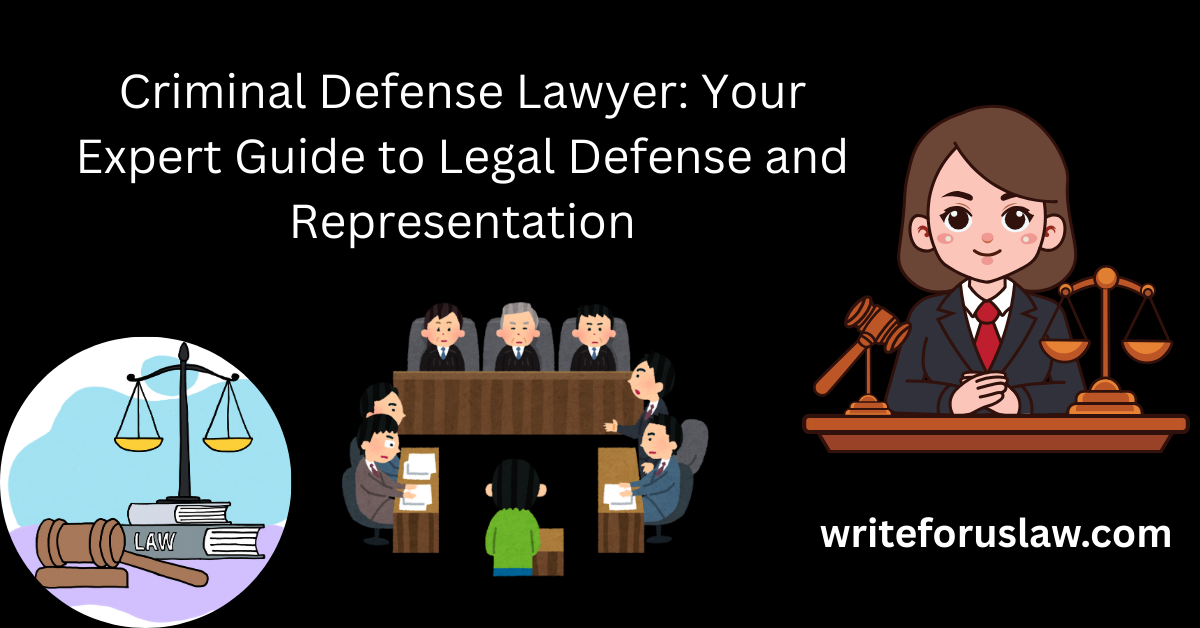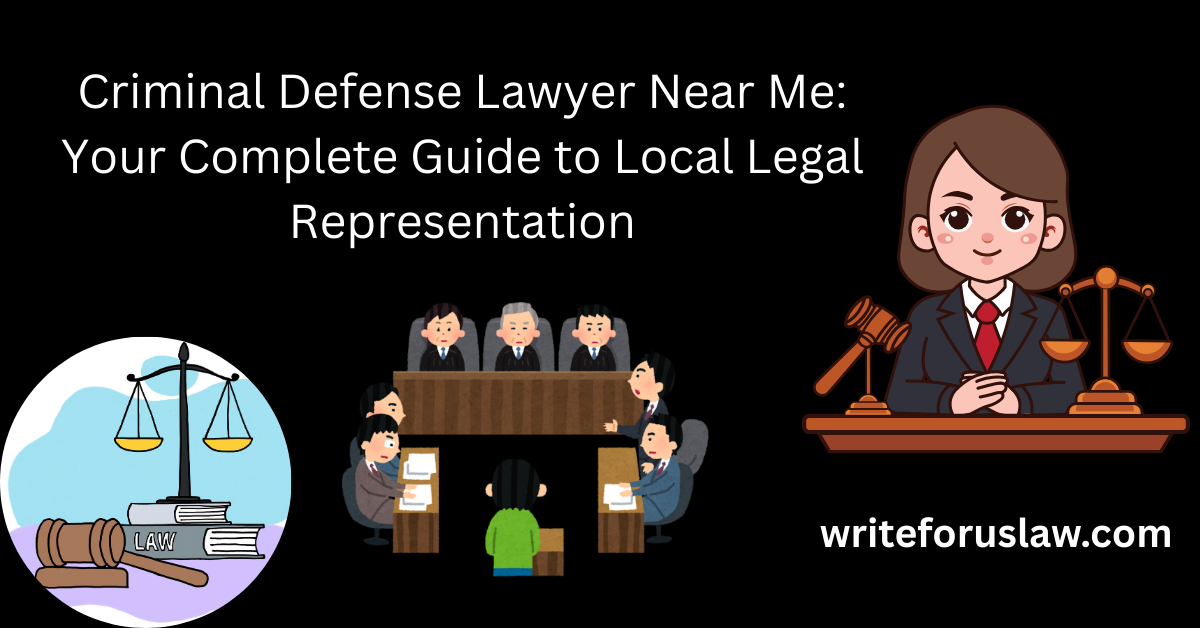Criminal Defense Lawyer: Your Expert Guide to Legal Defense and Representation
When facing criminal charges, securing an experienced criminal defense lawyer becomes your most critical decision. The legal system’s complexity demands professional expertise, strategic thinking, and unwavering dedication to protect your rights and freedom. Whether you’re dealing with misdemeanor charges or serious felonies, understanding what makes an effective criminal defense attorney can significantly impact your case outcome.
Understanding the Role of a Criminal Defense Lawyer
What does a criminal defense lawyer do? Criminal defense attorneys serve as your legal shield against prosecution, working tirelessly to protect your constitutional rights throughout the legal process. These legal professionals specialize in defending individuals and organizations charged with criminal activity, ranging from minor infractions to major felonies.
Criminal defense attorneys handle various responsibilities including case investigation, evidence analysis, witness interviews, plea negotiations, and courtroom representation. They possess deep knowledge of criminal law, procedural rules, and constitutional protections that ordinary citizens may not fully understand.
Types of Criminal Cases Handled
Federal criminal defense lawyers handle cases involving federal crimes such as tax evasion, immigration violations, drug trafficking across state lines, and white-collar crimes. These attorneys possess specialized knowledge of federal court procedures and sentencing guidelines.
White collar criminal defense lawyers focus specifically on financial crimes including fraud, embezzlement, insider trading, money laundering, and corporate misconduct. These cases often involve complex financial records and require attorneys with backgrounds in both criminal law and business practices.
Local criminal defense attorneys handle state-level charges including DUI, domestic violence, theft, assault, drug possession, and various misdemeanors and felonies within state jurisdiction.
Finding the Right Criminal Defense Lawyer Near Me
Searching for a criminal defense lawyer near me requires careful consideration of several factors. Geographic proximity matters because local attorneys understand regional court systems, judges, prosecutors, and procedural nuances that can significantly impact case outcomes.
Key Factors in Attorney Selection
Experience stands as the most crucial factor when evaluating potential legal representation. Look for attorneys who have successfully handled cases similar to yours, possess trial experience, and demonstrate a track record of favorable outcomes for their clients.
Specialization matters significantly in criminal defense. A Los Angeles criminal defense lawyer specializing in drug crimes may not be the ideal choice for white-collar defense, while a federal criminal defense lawyer might be overkill for a simple misdemeanor charge.
Communication skills and accessibility should also influence your decision. Your attorney should explain complex legal concepts clearly, respond promptly to communications, and keep you informed about case developments throughout the legal process.
Regional Expertise: Location-Specific Considerations
Orange County Criminal Defense Lawyer
Orange County’s legal landscape presents unique challenges and opportunities for criminal defendants. An experienced Orange County criminal defense lawyer understands local court procedures, familiar with area judges and prosecutors, and knowledgeable about regional plea bargaining practices.
Orange County courts handle thousands of criminal cases annually, from simple traffic violations to complex white-collar fraud cases. Local attorneys possess invaluable relationships within the legal community that can benefit client outcomes through effective negotiation and strategic case management.
Rancho Cucamonga Criminal Defense Lawyer
The best criminal defense lawyer Rancho Cucamonga offers combines local knowledge with broader regional experience. Rancho Cucamonga falls within San Bernardino County’s jurisdiction, requiring attorneys familiar with both local municipal courts and county superior court systems.
Criminal defendants in Rancho Cucamonga benefit from attorneys who understand the area’s demographic characteristics, local law enforcement practices, and community standards that may influence jury selection and case presentation strategies.
Major Metropolitan Areas
Los Angeles criminal defense lawyers operate within one of the nation’s largest and most complex court systems. LA County processes more criminal cases than entire states, requiring attorneys with exceptional organizational skills and deep procedural knowledge.
New York criminal defense lawyers navigate a similarly complex system with unique characteristics including specialized courts, diverse demographics, and high-volume caseloads that demand efficient case management and strategic thinking.
Chicago criminal defense lawyers, Philadelphia criminal defense lawyers, and Houston criminal defense lawyers each operate within distinct legal environments with specific procedural requirements, local customs, and judicial preferences that influence case strategies.
Southwest Region Considerations
Las Vegas criminal defense lawyers handle unique challenges related to tourism-related crimes, gaming violations, and Nevada’s specific criminal statutes. The city’s 24/7 economy creates unique legal scenarios requiring specialized knowledge.
Phoenix criminal defense lawyers operate within Arizona’s distinctive legal framework, including specific DUI laws, drug possession penalties, and sentencing guidelines that differ from other states.
San Diego criminal defense lawyers often handle border-related federal crimes in addition to state charges, requiring knowledge of both state and federal criminal procedures.
Criminal Defense Lawyer Law Firm Structure and Services
Modern criminal defense practices often operate as specialized law firms offering comprehensive legal services. A reputable criminal defense lawyer law firm provides multiple advantages over solo practitioners including shared resources, diverse expertise, and continuous case coverage.
JZLawFirm.com and JZLawFirm Criminal Defense Lawyer Services
Established criminal defense firms like JZLawFirm typically offer comprehensive criminal defense services including initial consultations, case evaluations, investigation services, plea negotiations, trial representation, and post-conviction relief assistance.
These firms often maintain relationships with expert witnesses, private investigators, and other professionals essential for building strong defense strategies. JZLawFirm.com represents the type of modern legal practice that combines traditional advocacy skills with contemporary technology and resources.
Understanding Criminal Defense Lawyer Salary and Fee Structures
Criminal defense lawyer salary varies significantly based on experience, location, specialization, and practice structure. According to legal industry data, criminal defense attorneys earn anywhere from $50,000 annually for entry-level positions to over $300,000 for experienced partners in prestigious firms.
Fee Structures in Criminal Defense
Most criminal defense attorneys work on flat fee arrangements for specific services rather than hourly billing. These fees vary based on case complexity, attorney experience, and geographic location. Simple misdemeanor cases might cost $1,500-$5,000, while complex felony cases can require $10,000-$50,000 or more.
Hourly rates for criminal defense work typically range from $200-$800 per hour, depending on attorney experience and reputation. Some attorneys offer payment plans to make legal representation more accessible to clients facing financial hardship.
Retainer agreements are common in criminal defense, requiring upfront payments that attorneys draw against as they work on cases. These arrangements provide clients with guaranteed representation while ensuring attorneys receive compensation for their services.
The Criminal Defense Process: From Charges to Resolution
Understanding the criminal defense process helps defendants make informed decisions about legal representation and case strategy. The process typically begins with arrest or formal charges and continues through various stages including arraignment, discovery, plea negotiations, trial preparation, and resolution.
Initial Case Assessment
Effective criminal defense begins with thorough case assessment including evidence review, witness identification, and legal research. Attorneys must quickly identify potential defenses, constitutional violations, and strategic opportunities that could benefit their clients.
This assessment phase often determines overall case strategy and helps attorneys provide realistic expectations about potential outcomes. Experienced attorneys can often predict likely prosecution approaches based on case facts and local practices.
Investigation and Discovery
Criminal defense attorneys conduct independent investigations to uncover evidence supporting their clients’ cases. This might include interviewing witnesses, reviewing police reports, analyzing physical evidence, and consulting with expert witnesses.
The discovery process allows defense attorneys to review prosecution evidence, identify weaknesses in the government’s case, and prepare appropriate counter-strategies. Effective discovery management often determines case outcomes.
Plea Negotiations
Most criminal cases resolve through plea negotiations rather than trials. Skilled criminal defense attorneys leverage their knowledge of local practices, prosecutor preferences, and case strengths to negotiate favorable plea agreements for their clients.
Plea negotiations require careful consideration of potential trial outcomes, sentencing guidelines, and client goals. Attorneys must balance the certainty of plea agreements against the possibility of better trial outcomes.
Trial Advocacy and Courtroom Representation
When cases proceed to trial, criminal defense attorneys must demonstrate exceptional advocacy skills including jury selection, opening statements, witness examination, evidence presentation, and closing arguments.
Jury Selection Strategy
Effective jury selection often determines trial outcomes in criminal cases. Attorneys must identify potential jurors likely to be sympathetic to defense arguments while challenging those who might be predisposed toward conviction.
This process requires understanding of psychology, demographics, and human nature combined with legal knowledge and strategic thinking. Experienced trial attorneys develop instincts for jury selection that come only through extensive courtroom experience.
Evidence Presentation
Criminal defense attorneys must effectively present evidence supporting their clients’ innocence or challenging prosecution arguments. This requires thorough preparation, clear communication skills, and strategic thinking about evidence order and presentation methods.
Expert witnesses often play crucial roles in criminal defense, providing technical expertise that helps juries understand complex evidence or alternative explanations for prosecution claims.
Post-Conviction Services and Appeals
Criminal defense representation doesn’t always end with conviction. Attorneys often assist clients with appeals, sentence modifications, and post-conviction relief procedures designed to correct legal errors or address new evidence.
Appeals Process
Criminal appeals focus on legal errors that occurred during trial rather than re-examining evidence or witness credibility. Appellate attorneys must identify procedural violations, constitutional errors, or other legal issues that might warrant case reversal or sentence modification.
The appeals process requires different skills than trial advocacy, focusing more on legal research, brief writing, and oral argument before appellate panels rather than jury persuasion.
Post-Conviction Relief
Various post-conviction remedies exist for defendants who believe they received ineffective assistance of counsel, were convicted based on false evidence, or can present new evidence supporting their innocence.
These procedures are complex and time-sensitive, requiring attorneys with specialized knowledge of post-conviction law and procedures. Success rates vary significantly based on case circumstances and the quality of legal representation.
Technology and Modern Criminal Defense
Contemporary criminal defense increasingly relies on technology for case management, evidence analysis, and client communication. Modern law firms utilize case management software, electronic discovery tools, and digital communication platforms to provide efficient representation.
Digital Evidence Analysis
Many criminal cases now involve digital evidence including cell phone records, computer files, social media posts, and surveillance footage. Defense attorneys must understand technology sufficiently to challenge digital evidence and present alternative interpretations.
Expert witnesses specializing in digital forensics often assist defense attorneys in understanding and challenging prosecution claims about digital evidence. This expertise becomes increasingly important as technology plays larger roles in criminal investigations.
Virtual Court Proceedings
The legal system has increasingly adopted virtual proceedings for certain hearings, requiring attorneys to adapt their advocacy skills to video conferencing platforms while maintaining effective client representation.
These technological changes require attorneys to invest in appropriate equipment, develop new communication skills, and adapt traditional advocacy techniques to virtual environments.
Choosing Excellence in Criminal Defense Representation
Selecting the right criminal defense attorney requires careful evaluation of experience, specialization, communication skills, and track record. The stakes in criminal cases demand nothing less than excellent legal representation.
Questions to Ask Potential Attorneys
Prospective clients should inquire about attorneys’ experience with similar cases, their trial success rates, fee structures, and communication practices. Understanding how attorneys approach case preparation and strategy development provides insight into their likely effectiveness.
Ask about the attorney’s relationship with local prosecutors and judges, as these professional relationships can significantly impact plea negotiations and case outcomes. However, be wary of attorneys who claim guaranteed outcomes, as ethical attorneys cannot promise specific results.
Red Flags in Attorney Selection
Avoid attorneys who guarantee specific outcomes, demand large upfront payments without clear fee agreements, or seem unfamiliar with procedures relevant to your case type. Poor communication during initial consultations often indicates ongoing communication problems.
Be cautious of attorneys who seem to handle too many cases simultaneously or appear unfamiliar with recent legal developments affecting criminal defense practice.
Frequently Asked Questions
How much does a criminal defense lawyer cost?
Criminal defense attorney costs vary significantly based on case complexity, attorney experience, and geographic location. Simple misdemeanor cases might cost $1,500-$5,000, while complex felony cases can require $10,000-$50,000 or more. Many attorneys offer payment plans to make representation more accessible.
What’s the difference between a public defender and a private criminal defense lawyer?
Public defenders are government-employed attorneys who represent defendants who cannot afford private counsel. While many public defenders are skilled attorneys, they often handle large caseloads that may limit the time and resources available for individual cases. Private attorneys typically handle fewer cases simultaneously and can provide more personalized attention.
When should I hire a criminal defense lawyer?
You should hire a criminal defense attorney immediately upon learning about potential charges or being arrested. Early legal intervention can prevent costly mistakes, protect your rights during questioning, and allow attorneys to begin building your defense while evidence is fresh.
Can a criminal defense lawyer get charges dismissed?
Experienced criminal defense attorneys can sometimes get charges dismissed by identifying procedural errors, constitutional violations, insufficient evidence, or other legal defenses. However, dismissals depend on specific case circumstances, and ethical attorneys cannot guarantee such outcomes.
How do I find the best criminal defense lawyer for my case?
Research attorneys’ experience with cases similar to yours, read client reviews, check bar association records, and schedule consultations with multiple attorneys. The “best” attorney for your case combines relevant experience, strong communication skills, and a fee structure you can manage.
What questions should I ask during a consultation?
Ask about the attorney’s experience with similar cases, their assessment of your case’s strengths and weaknesses, potential defenses, likely outcomes, fee structure, and communication practices. Also inquire about their trial experience and relationships with local prosecutors and judges.







Post Comment